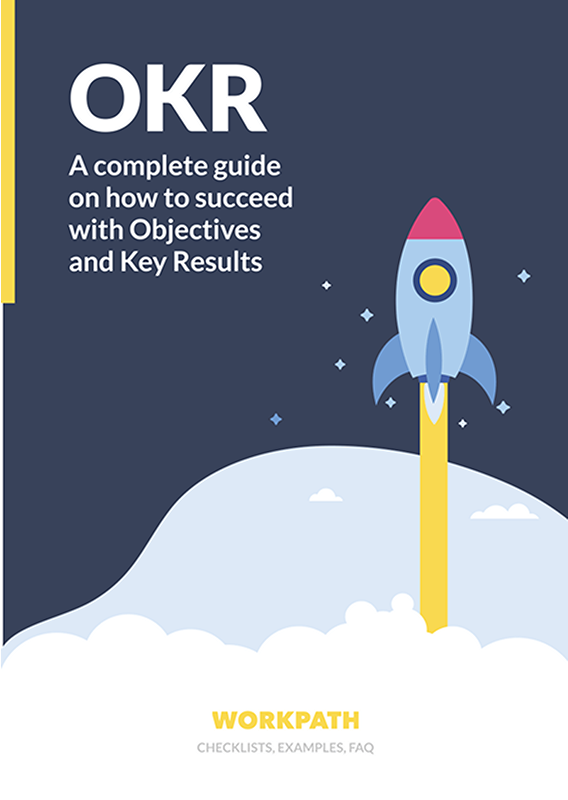OKRs as a performance management framework have been on the rise for some time. The method from Silicon Valley is an important tool for agile, modern companies to be able to assert themselves in constantly changing markets. For a brief explanation of the topic, you can read our article "Objectives and Key Results (OKR) - A Definition". However, if you want to deal with the topic in more detail, it is recommended to take a look at professional literature. These have several advantages over a brief Internet search:
- You learn from recognized experts with many years of experience in the OKR method.
- Important best practices and common challenges are explained. This saves you from trial and error and you learn about avoidable problems in advance.
- You get hands-on tips from the practice.
To help you take advantage of these benefits, we would like to give you an overview of the most popular OKR books and their contents. Afterwards you will be well prepared to choose the right book to enter the world of OKRs. You can also find further content in our Workpath Magazine, Academy and Masterclass.
L. John Doerr (born June 29, 1951) is a U.S. investor and venture capitalist at Kleiner Perkins in Menlo Park, California. His book "Measure What Matters" is considered a standard work on OKRs and is often used as an introduction to the subject. He is the one who introduced OKRs at Google and ever since is helping other companies to do so.
In terms of content, the book covers the following key points:
- An overview of the OKR framework.
- Detailed insights into planning and executing OKRs using Google, Intel, Uber and other companies as examples.
- Case studies & background knowledge on the use of OKRs.
Conclusion: Beware, "Measure What Matters" is not an OKR guide or manual. Rather, the work focuses on John Doerr's experiences and lessons learned related to OKRs. Challenges associated with implementing the framework are hardly described here. Nevertheless, the book is well worth reading. You will get insights on how different large companies implement OKRs and get inspiration for your own process.
Price: about 12$
Link: Amazon
Andrew Stephen Grove was a Hungarian-American businessman, engineer and CEO of Intel Corporation. Grove developed the original OKR approach and introduced it at Intel in 1971. He then first documented it in "High Output Management" in 1983. In his book, he still presents the method as "iMbO - Intel Management by Objectives" - as a further development of MbO (Management by Objectives). John Doerr also learned about the method in a Grove course when he was still an investment manager at Intel.
Content:
- Techniques for building highly productive teams.
- Practical tips for entrepreneurs on motivating and developing employees.
- Manual for navigating real-world business scenarios.
Conclusion: The book is not a complete guide to OKRs, but reads more as a management manifesto that reflects the basic ideas and ideology behind the OKR approach. Grove focuses on two questions that form the foundation for today's Objectives and Key Results (OKR) model:
- Where am I going? (Objectives) and
- What do I have to do in order to get there? (Key Results)
This work laid the foundation for OKRs, so it is more for getting started and absorbing the underlying mindset.
Price: about 12$
Link: Amazon
Christina Wodtke, who has held various leadership positions in numerous Silicon Valley companies such as Zynga and LinkedIn, answers questions about goal management and OKRs in her book "Radical Focus." She describes methods for effective goal setting and how to learn even through failure.
The following questions are answered in the book:
- How do I inspire a diverse team to pull together and achieve ambitious goals together?
- What role do OKRs play in modern organizations and what value do they add?
- How do you stay motivated despite setbacks and disappointments?
- What are the most common reasons why goals are not achieved?
Conclusion: Wodtke uses fictitious case studies fed by her own practical experience. The described tips for the effective use of OKRs are helpful, no matter if you work in a startup or at Amazon.
Price: about 30$
Link: Amazon
Felipe Castro is an OKR coach and helps companies optimize their goal achievement by using the OKR framework. The author, speaker and OKR evangelist is one of the most consulted OKR experts in the world. With his free work "The Beginners Guide to OKR", he provides interested parties with a comprehensive resource for learning about OKRs.
The following questions are answered in the book:
- What are OKRs and what are the benefits of this framework?
- What is the difference between strategic and tactical OKRs?
- What are success criteria and types of key results?
- What is the process of a typical OKR cycle?
- What are common mistakes when working with OKRs (e.g., Why you should separate OKR and compensation)?
Conclusion: Felipe Castro wrote this book for beginners, however, due to its scope and underlying expertise, it may also be valuable to many long-time OKR users. The work is very comprehensive for a free PDF and definitely a must-read for all OKR practitioners and those who would like to become one.
Price: 0€
Link: The Beginner's Guide to OKR
Douglas Hubbard is the creator of the Applied Information Economics method and the founder of Hubbard Decision Research. His books are used in courses at many major universities. His work, How to Measure Anything, outlines methods for capturing the Key Results necessary for OKRs. Douglas Hubbard's mission is to make measurable things that were previously considered "unmeasurable," for example, customer satisfaction, organizational flexibility, technology risk, or technology ROI.
Key takeaways:
- New measurement methods, updated with each edition.
- An explanation of why "immeasurability" is based on certain common misconceptions about measurement and measurement methods, and an attempt to clear up these misconceptions.
- Practical methods for measuring a variety of "intangibles".
- An online database (www.howtomeasureanything.com) with downloadable practical examples.
Conclusion: "How to Measure Anything" should rather be read as a complement to OKR literature. In this book, you will learn how to make goals or processes measurable - a basic skill to create Key Results and achieve Objectives.
Price: about 20$
Link: Amazon
Two of the world's leading OKR consultants and business researchers, Paul Niven and Ben Lamorte, show how to iterate qualitative objectives (Objectives) through quantifiable key results (Key Results) to achieve focus, employee motivation, and better communication.
Key contents include:
- The origins of OKRs.
- The guiding principles underlying the framework.
- Some practical examples of how leading companies implement OKRs and use them in everyday life.
Conclusion: This book is a complete handbook for leaders and managers who want to lead their organizations to long-term business success with OKRs.
Price: approx. 30$
Link: Amazon
In case you want to dive deeper into the OKR framework, you will find a variety of great works by experienced experts in our list.
If you just want to get some basic information, we recommend "The Beginners Guide to OKR" by Felipe Castro. There you will learn all the essentials about OKRs and the underlying methodology in a free PDF.
More advanced OKR practitioners should rather reach for "Measure What Matters" by John Doerr. Here you'll get real-world tips and read about real-world scenarios that will help you implement OKRs in your own organization.
Another tip for experienced OKR users is "How to Measure Anything" by Douglas W. Hubbard. This book is especially interesting for those who have been working with OKRs for a while and want to create and measure even more professional Key Results.







